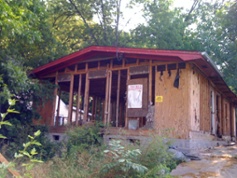Under Construction: ENERGY STAR Version 3 Home in Atlanta, Georgia

Here’s a house we designed for a builder in the historic Grant Park neighborhood in Atlanta, which should be completed by January 1, 2012. The home is 2-stories, has 4-bedrooms and 3-and-a-half baths, and is just under 2,200 square feet. The builder decided to stick-build the home, but it was orginally designed to be built using modular construction techniquies.
Probably one of the more exciting things about the house was that it has been Designed to Earn the ENERGY STAR, which means that it meets strict guidelines for energy efficiency and water management set by the EPA. That was in addition to the heavy design guidelines of the neigborhood! Both of which we passed with flying colors.
The design has a projected HERS Index of around 50, which means that it is at approximately 50% more energy efficient than the same home built to the 2004 International Energy Conservation Code (IECC). The house will operate solely on electricity (no gas or alternative fuel), and has a projected average monthly energy bill of $125.
If we’re able to meet the deadline of January 1st, the house will be among the first in the country to be certified to Version 3.0 of the ENERGY STAR New Homes program, if not THE first.
When the builder contacted us in the middle of May, he was looking for a set of plans to build a spec home. Little did he know that he would also be getting a lesson or two in building science. He has not only taken it all in stride, but has embraced what he sees as “the way things are going.”
The full set of architectural and structural drawings that we provided meet all of the requirements of the groundbreaking new georgia state energy code. They also include a complete HVAC System Design and Specifications, and construction details to exceed will make the home exceed energy code requirements for air infiltration, thermal resistance and water management.
 We’ll be breaking ground in the next week or so on what will be a very exciting project for Energy Vanguard, the builder, and the future homeowner! That could be you! It’s certainly going to be a worthy replacement of what was on the site before.
We’ll be breaking ground in the next week or so on what will be a very exciting project for Energy Vanguard, the builder, and the future homeowner! That could be you! It’s certainly going to be a worthy replacement of what was on the site before.
Stay tuned for progress photos and videos during construction.
This Post Has 8 Comments
Comments are closed.

What would it take to revise
What would it take to revise the HERS score to something more meaningful and lasting. Here I see a reference to the building having a HERS score of 50 relative to a house built to the 2004 IECC. Most recent articles I have read reference IECC 2006 and, in some jurisdictions it seem were are already looking at IECC’s 2012 and beyond. Is it not about time that the HERS score reflects “relative to ZERO” and we stop chasing our tail.
Terry H.:
Terry H.: I like your thinking! The problem with attaching the HERS Index to a specific energy code is that the Index becomes less meaningful the more out of date that code becomes. RESNET made the decision to go with the 2004 IECC, which is pretty much the same as the 2006 IECC, and it appears they have no intention of changing it anytime soon. They do have a good argument, too. This number, the HERS Index, is just referencing the energy performance of a particular home to a baseline. It doesn’t really matter what the baseline is because we’re talking about relative performance. Every time we change the baseline, we introduce a discontinuity so that the houses before and after aren’t on the same scale. For example, before 2006, houses got a HERS Score based on the 1993 Model Energy Code. You can’t compare a HERS Index to a HERS Score.
One number I like is energy intensity, the energy used per square foot of conditioned floor area. That would be one that uses zero as a baseline, as you suggest. I wrote an article about it last year and have made available a spreadsheet I put together for this: What’s Your Energy Efficiency Number?.
Great job Chris!
Great job Chris!
I am very interested in finding out how much money is available to qualify for an energy efficient mortgage on this one. Over $10,000 is my guess.
Keep up the good work!
Sounds like a great project
Sounds like a great project dude. Keep us posted on the progress.
Great article, looking
Great article, looking forward to hearing and seeing more. Any idea what its HERS index relative to current Ga Code would be? Just curious. . .
Great work Chris! I’ll keep
Great work Chris! I’ll keep my fingers crossed for you on Jan 1, and watch for updates along the way!
Thanks, all!
Thanks, all!
Jason: we’ll have to keep in touch on this. I think the builder will be just as excited to see what we come up with.
Ted: Not sure what it’s HERS index would be based on current code, but I know that it exceeds it based on the code research that I did. In reality, I think the HERS will be even lower, as I play it a little conservative when I do the projections. Once we have finals on everything, we’ll post them here.
Appreciate all your support and comments.
Sounds great and i believe
Sounds great and i believe its will booming. All the best.
Have any idea about Isolierschlauch UL, what language it is?